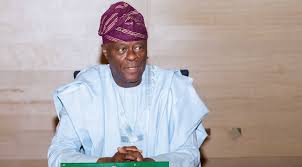The Minister of Finance and Coordinating Minister of the Economy, Mr. Wale Edun, has said that President Bola Tinubu’s economic reforms have brought in N6.9 trillion in government revenue from January to April 2025. This figure is a 40 per cent rise compared to the N5.2 trillion generated during the same period in 2024.
Edun made this statement in Abuja on Monday during the second quarter 2025 Citizens and Stakeholders’ Engagement Session focused on fiscal performance and reform progress. He noted that the growth in revenue was largely driven by key reforms implemented by the current administration.
The minister explained that the federal government has focused on blocking leakages, promoting transparency, and encouraging investment by removing harmful economic practices. According to him, the increase in revenue is a result of foreign exchange market liberalisation, strong fiscal management, and technology-driven accountability in Ministries, Departments and Agencies.
He said that one of the major issues the reforms addressed was the abuse of the foreign exchange system. Before now, there was a large gap between the official rate and the black market rate, which created room for some individuals to profit by buying dollars cheaply at official rates and selling at high prices in the black market.
Edun said that this gap has now significantly reduced and that the dollar black market has “essentially been eliminated” due to the policies of the Central Bank of Nigeria, which now allows market forces to determine the exchange rate.
He explained that the difference between official and parallel rates will always exist slightly because of paperwork and convenience, but the large profit margin that encouraged round-tripping and discouraged genuine business has now gone.
“No more can a businessman or market woman wake up, get forex at official rate, and sell at high profit in the black market,” Edun said.
He described the government’s reform journey in three stages: first, removing fuel subsidy and forex distortions; second, stabilising the economy; and third, promoting inclusive and sustainable growth. He said the country is currently in the third phase.
According to the minister, Nigeria’s external reserves have grown from $3 billion to over $23 billion in less than two years. He added that total annual revenue rose from N12.5 trillion in 2023 to more than N20 trillion in 2024, and the upward trend is continuing in 2025.
He also revealed that Nigeria’s debt service-to-revenue ratio has improved, dropping from 150 per cent in early 2023 to about 60 per cent by the end of 2024. He attributed this to increased revenue and reduced borrowing from the Central Bank through Ways and Means.
Edun stated that credit rating agencies like Fitch and Moody’s have noticed these improvements and upgraded Nigeria’s credit ratings. He said such ratings help the country borrow at cheaper rates and attract more investment.
While acknowledging that oil revenues are still below expectations due to low production and global price changes, Edun said efforts are ongoing to raise production. He mentioned that domestic refining capacity has now reached 1.2 million barrels per day, led by Dangote Refinery and other smaller modular refineries.
He noted that this will reduce Nigeria’s dependence on crude oil exports and help the country earn more from value-added petroleum products.
In addition, the minister said the government is also working to improve the lives of everyday Nigerians. He mentioned that grants and low-interest loans have been made available for small businesses, and new mortgage products offering interest below 10 per cent for up to 25 years are now accessible through the Ministry of Finance Incorporated (MoFI), in partnership with pension funds and development agencies.
He further revealed that 37 million Nigerians now benefit from improved primary healthcare centres, and 400,000 young people are being targeted under a new credit initiative with loan packages between N200,000 and N300,000.
He added that electricity output has gone up by 40 per cent due to reforms in the power sector, such as the Band A tariff and new metering projects. He also pointed to growing investment in renewable energy, mentioning Nigeria’s participation in the World Bank and African Development Bank’s “Mission 300” to provide electricity to 300 million Africans by 2030.
Speaking on behalf of MoFI Managing Director Dr. Armstrong Takang, Executive Director Mr. Tajudeen Ahmed said the government has identified N38 trillion worth of public assets so far. He added that the figure could rise to N70 trillion by 2026 and up to N100 trillion in the next ten years. He said these assets would be used to attract investment and improve transparency in public finance.
